#where a character says they like something or feel something and the narration has to be so. sarcastic about it?
Text
OMITB S4:E5 "Adaptation"
We're at the halfway mark and I feel like fans with a Hercule Poirot or Sherlock Holmes type of IQ could solve the mystery by now but I am not one of those fans so I'm just here to recap and debunk or strengthen theories I already had. I say this every week but I am truly loving the pacing of this season and that they don't shy away from answering questions early on instead of trying to shoehorn everything in for the season finale. As always spoilers ahead!
Ok so now we officially have confirmation that there are two killers. After circling back to the footprint on the windowsill of the Dudenoff apartment, the tacky paper used on the photoshoot and production room set reveals that the footprint belongs to one of the Brothers sisters. We see that one twin is physically strong enough to lift a body when she lifts Oliver and moves him onto his correct mark. I don't think that necessarily means both twins are involved in the murder though. We also end the episode with that same twin being missing and hearing a gunshot implying that she has been killed. I have been waiting YEARS for a season in which the bodies start piling up and it's finally happening!

This episode was narrated by Marshall the writer and I don't know how to feel about his character. I get that he and Mabel are supposed to be similar in that they both have imposter syndrome but he in general just gives off red flags. He's inserting himself into investigating which is something killers do and him having the fake facial hair introduces the idea of the killers having disguises so clearly he was important to this episode. Not to mention he's giving stalker vibes or parasocial Arconiac vibes. I find it very interesting that Mabel and Charles did not view the video of his stand up to verify his alibi. This could very well mean that he was at the Arconia the night that Sazz was killed. He also never stepped on the tacky paper so we don't have his footprint. That's two strikes against him.

You know who else we didn't see step on the tacky paper? Glen Stubbins. Who is back by the way. I still don't care for his character but I am starting to suspect him. He's physically capable of jumping on the windowsill because he's a stunt performer and for that same reason I'm sure he's also capable of aiming and firing a gun. Also how did he know exactly where Charles lived? They only met the one time at the Stunt Man bar. And yes it's sweet that he brought bread but he could have left it downstairs with Lester. As Ben's stunt double I can't help but wonder if he was present at the Arconia the night of Sazz's murder but in disguise. There's actually a really compelling theory on the hulu subreddit that Glen is the killer if you want to check it out.
Bev actually does have an alibi for that night and seems to only be guilty of wanting her movie made. Can we rule her out just yet? Idk but we'll see. She didn't seem that confident while aiming the gun or firing it off to prove it wasn't loaded. Her revealing Sazz's voicemail and the time it was left definitely proved helpful in establishing a timeline and confirming that there are two killers. Or three if you think it's three people working together.
Howard working for the production team is only strengthening my theory that he's the Moriarty. This man is everywhere! He was working at the theater last season and immersed in the plot there and now here he is in the center of it all once again. Again I don't think he's an evil mastermind, I just think he started off envying the closeness of the trio and now he's high off the power of manipulating things behind the scenes.

Have any of you heard of the opera La Forza Del Destino? In A Series of Unfortunate Events, there is a reference and parallel to it in which a character is mortally wounded after a weapon is accidentally fired off and strikes them. What if the killer was aiming for Charles, saw Sazz dressed similar to him and was aiming to shoot, and the accomplice called to warn them that it was the wrong person but something startled the killer and they accidentally shot Sazz? Like for example they were ready to go and then someone knocked loudly or something which not only muffled the noise of the phone but startled them enough to shoot.

This season has so many parallels and coincidences that we have to assume is on purpose. We've got multiple dopplegangers and cases of mistaken identity, guns being misfired (Eva with Rudy's prop gun and Bev with Sazz's loaded gun), and even the blackout in the S4 premiere vs the fire alarm going off in the S1 premiere.
My small takeaways from the episode:
Mabel being 30 and having an identity crisis is so relatable and I hope she finds her way by the end of the series.
Lester talking about wearing a gimp mask is WILD
Charles mentioning having an account in Belize and Detective Williams pretending to unhear it is hilarious
I'm beyond tired of this Oliver and Loretta plotline and him being insecure about her new status as a celebrity. WRAP IT UP!
Fans keep bringing up the cold case and I wonder if that will become the plot point in season five
Zach Galifianakis telling Oliver about how Jonk (sp?) ran through the seven dwarfs and that they could be heard Hi-Ho'ing from the trailer took me out 🤣
Charles having a new murder board each week is my favorite thing because that's literally all of us fans each week after watching a new episode
Bev and Cinda would be besties or frenemies and I really need to see them in a scene together before the season is over
#omitb#only murders in the building#only murders hulu#omitb spoilers#only murders spoilers#omitb theories
40 notes
·
View notes
Text
Titans #15 Review
Oh my god. Where do I even begin.
To start with my one and only positive: the art is gorgeous. Lucas Meyer is the best artist the Titans have had in ages, and his new Raven design really delivered. I'm so sad that it appears that the artist who'll be taking over for him in #16 is undoing his design changes, I think it's a massive shame. I did appreciate the detail of Raven's white cloak design having rings on her index fingers, but it feels a little pointless without the lore of Azar's rings to back it up.
Now, the negatives: literally everything else about this comic. This comic fails to deliver on an eight issue arc in any kind of satisfying way, has a bizarre and out of character tone, and severely misunderstands the lore of its main villain. They literally defeated Trigon with the power of friendship. Maybe that could work in Teen Titans Go, but in a main timeline DC comic? What?
First, the demon Raven stuff. Gar saying that demon Raven and regular Raven aren't two different people--yeah, obviously. The severe degree of separation between demon Raven and regular Raven has been one of the big issues of this arc, and this conclusion is as unsatisfying as the rest of it. Raven and her demon side being able to talk face to face isn't new, but them being two separate people with separate physical bodies who can operate completely independently of each other--while there is some precident for this, to me it's a very strange writing choice and misses the point of a demon Raven arc.
The original idea of Raven and her demon side was that her demon side is her. It's all the worst instincts she inherited from Trigon locked up and carefully controlled. When Trigon takes control of her and turns her into her demon form, everything she's repressed, both good and bad, is released. Raven still having a soft spot for the Titans in her demon form makes sense; she's still Raven, just corrupted by Trigon into something she isn't. Raven deciding to stop being evil (not that she even really was) and going back to normal from one brief conversation with her teammate does not, and is really anticlimactic.
It's just such a waste of the story's potential. If you don't want to commit to Raven being the villain of the story, don't do a demon Raven arc! It's possible to do a Trigon story without Raven being evil, I don't get why they didn't just do that. None of the drama with Raven being evil was particularly well executed, and all it seemed to do was drag the comic on longer and longer with nothing actually happening, because they were unwilling to make Raven actually do anything villanous.
All that pales in comparison to how they defeated Trigon. I don't think I've ever seen such blatant disregard for previous canon. As Raven, powered up by the other Titans, fights Trigon, Gar narrates as follows:
"I doubt Trigon has ever been in a fight. An actual fight. With someone his own size and power level. Never had to face someone like Nightwing one-on-one. Never tried to stand while being pinned by the power of Donna Troy's will. Never been blasted... with a giant-sized Apokoliptian blast from Cyborg. And never, ever... felt the full force of a Tamaranean hit powered by the stars."
WHAT?
This comic canonically takes place in the same timeline as the New Teen Titans. There are many homages to the New Teen Titans. It has been made very clear that the team started as the New Teen Titans, and then after many, many years of crazy comic book history the team reformed as the Titans of this run.
The first ever Trigon arc that introduces him and Raven as characters takes place in the first six issues of the New Teen Titans, and culminates in Trigon being defeated by the Titans and thrown into an interdimensional prison. I can't stress this enough: literally every single one of the things Gar said have never happened to Trigon happen in that fight. Donna uses her lasso to dampen Trigon's will, in combination with Raven and Arella's empathic abilities. Wally rips a hole through the fabric of reality to throw Trigon into, and Kory and Vic connect their powers to amplify their blasts to throw Trigon into the interdimensional rift. The whole thing is coordinated and managed by Dick Grayson (who was still Robin at the time).
Gar was there when all this happened. There is no reason for him to not know that this happened. The only explanation is Tom Taylor doesn't know, or he doesn't care. This would be disappointing for any comic book run, but it leaves an especially sour taste in my mouth for this to happen in a run that's so built on NTT homages. It's clear that the writing could not care less about the comic it was inspired by.
And then Garth causes Trigon to have a heart attack. Okay, that was just stupid. Admittedly, I did think the page of Raven stabbing Trigon was cool (again, the art is really the only saving grace here), but her saying "Fuck you, Dad"? Seriously? An ongoing problem in this run has been the dialog feeling janky and too much like lines from a generic superhero movie, and this line embodies that very well. I'm not opposed to swearing in comic books, but to me, this is not the right time for it. It doesn't fit the moment, and I think it's quite out of character for Raven, even if the sentiment behind it isn't.
And then Trigon isn't even dead? What does "Demons don't die. They just fade away." even mean?? Is he dead or not? Will he come back tomorrow or in a thousand years? It's such a strange, confusing letdown of an ending.
I didn't have high hopes for this issue, but it was somehow worse than I could ever have imagined. I'm so glad that this run is getting a new writer. Here's hoping that the coming issues will actually feel like a team book, and that the decades of lore and characterization of these beloved characters will actually be considered during writing.
25 notes
·
View notes
Note
nightfall was crazy, but I'm also kind of confused??? It went by sooo fast I was like WHAT? WAIT, WHAT? WAIT WAIT WAIT-
Love the fact that they went on with keefes whole "I'm not worth it, but you are, so I'm going to take over decisions we need to make (as a team) and screw them over so that they cause harm to me and not you!" Kinda vibe, honestly thought that after he came back from the neverseen in lodestar they were just going to forget about it, yk??
Only thing I really didn't like is that like...everyone has a slight distrust to keefe (at least in the start, till he apologized ) but Sophie, the person who was (in my opinion) most affected by his 'betrayal' never once had a doubt???? Like, if someone betrayed me, right? Yk they're my friend whatever whatever, ID STILL HAVE SOME KIND OF LIKE ISSUES WITH THEM???
I feel like her distrusting keefe and then slowly learning to trust him would have made the book MUUUCH better!!
Also, I'm still not getting where the Fitz discourse is coming from, like, his sibling just betrayed him, fell unconscious and WOKE UP WITH NO MEMORY OF ANYTHING?? I can see where the anger issues come from
Holy shit this was long, sorry!
-- @localburntoutkid
Had a blast reading this!
You’re so right about Keefe. That definitely doesn’t get dropped after lodestar, or even nightfall—it’s one of his character’s main flaws, and while it does shift and evolve as the series moves on, it’s kind of there, you know? And I’m really hoping it resolves in some way by the end of the series, because his arc is just… so interesting to me. Because it is NOT arc-shaped. At all.
I get what you mean about Sophie being the only one who doesn’t distrust Keefe when he comes back. I really like that too acknowledge that it’s a Sophie-specific thing, though! Too many people forget that this is a third person limited story told by an unreliable narrator, and act like Shannon Messenger herself is telling us Keefe deserves to be fully trusted. Sophie Foster decides, at the end of Neverseen, not to hate him, and Lodestar is where she has her moments of doubt and distrust, but even in Lodestar, she always believes in Keefe’s good intentions. There’s even a scene where she says something like “Yes, Keefe’s plan is horrible and I hate it, but his heart is in the right place. I have to believe that.” The part about keefe’s plan is paraphrased, but she did say she needs to believe his heart was in the right place, in that wording, and it’s fascinating to me. She’s very attatched to Keefe (obviously) and I think it’s mostly for her own sanity that she chooses over and over to believe that there’s something right about what he’s doing, because letting him go sounds excruciating, even by his own fault.
I actually have no issue with this being Sophie’s perspective, and I actually find it interesting especially in the context of sokeefe, but I wish we got to see this portion through another character’s eyes. For example, Fitz. Someone who does distrust him afterwards, and rightfully so.
As far as Fitz discourse goes, that stuff stemmed less from nightfall and more from flashback and legacy. I don’t hate Fitz in either of those books, but you’ll probably notice the moments that made people kind of go nuts about hating him and ran away with his character (personally, I think Fitz is fully understandable in both books, but don’t fully condone the way he acts in a few scenes, particularly in legacy. I’ll explain later after you’ve read it)
Don’t apologize for length, I’m literally Katie, have you met me? Everything I write is longer than I intend
I’m glad you’re having fun with the KOTLC series. Keep me updated!!!
26 notes
·
View notes
Text
something I really like about p3p compared to p5 is the extra bits of narration. I don't know if it's because the game doesn't have scenes with animated models or if regular p3 is like that, too, since I haven't played it. But like in Junpei's rank 10, when he's talking about going to see his dad, you get an extra text box that says 'Junpei's hands are trembling.' and in Shinji's rank 10 you get a few of them, one saying he toys with the pocket watch and one saying he looks down at his feet for a long time. Idk. They're nice. In p5, they use pretty much only the talking sprites and the character model animations to show emotion but things like trembling hands or staring at their feet are little things that probably wouldn't be animated but that add a lot to a scene I think.
#i got to junpei's rank 10 on my ng+ just now and it reminded me. the scene hits so much harder for me with that added bit of narration.#it says a lot about junpei in that moment yknow. ig it kind of fleshes the characters and their emotions out in a nice way#like in p5 the characters do have little model animations for certain emotions but theyre pretty general#ryuji has the one when he's unhappy where he scuffs his sneaker on the ground. ann has the one where she twirls her hair#but these narrations are for much smaller things. and theyre not reused all over the place so they carry more weight when they are used#idk. these are distinctly different to me than the animations in p5 and i cant concisely explain why.#i think part of it is the animations in p5 are used a lot so they feel much more general ig? and then the fact that the lil narrations#in p3p are for much smaller minute details. it feels more... idk. intimate? more telling of a character's state of mind? something like tha#and there probably ARE examples of this sorta thing in p5 too i just feel like it's very very uncommon in that game
20 notes
·
View notes
Note
Asking because I’m extremely curious about this, how did MonProm’s writing get different over time? I remember you saying that the lore and characters feel different, and that it's missing sincere character interactions, too. I know almost nothing about the lore and I’ve only seen a few people mention the characters, so I’d be interested in a rundown of what aspects you think got worse in the series
I wouldn’t mind a very long response since I’m not that active in the fandom, I need to catch up on what happened
sorry for taking so long to answer this! i kinda waffled on it for a long bit, mainly because i started doubting myself again, and whether or not this was me simply overreacting or being tinted by nostalgia or simply being extremely picky and choosy in what i like (the last of which is true, i seldom get into fandoms at all for this reason and stay away from most popular media, but i wasn't sure if it applied here). i've posted about it already, but i'm in the middle of a psychotic episode where i can't feel a lot of pleasure to begin with + most things i do experience ending up solidly in the "very bad" category, so as you can imagine, i really didn't want to mislead and check that i was actually in objective reality.
as it is, this is also when a lot more screenshots started to be posted in the monster prom tag, and that helped me bridge the gap back into returning to the games themselves and feel like i was making a more accurate judgement. if you're one of those people who have been posting screenshots, i sincerely thank you, and i appreciated seeing you in the tag greatly.
for those not in the know — i've been in the monster prom fandom since it first released, prior to even the first additional ending to be added (the "Punch the sun" ending, and i recall the minor fandom drama that happened at that time due to it). my impression of monster prom is very much influenced by this, as what got me into the first game was the fact that the characters genuinely seemed to care for each other and were friends with each other (not merely tolerating each other's presences nor dressing it up, they sincerely thought of each other as friends and were open about that fact), on top of the wide variety of small details and statements that, if taken at face value, could create compounding complexity in the lives of each and every character and had wider implications for their lives.
no, they were not necessarily explored nor even necessarily "real", with so many conflicting events and statements, but i liked this too, because it meant a wider flexibility in what you could imagine, helping to create a more tailored experience for everyone who thought about these characters. this was what i liked about the early fandom too. what was baseline "canon" was so vague and minimal that you could have wildly different interpretations of the same characters' histories and relationships with each other. you would have radically different perspectives on what the world itself looked like, what it was like, that there wasn't really any wrong answers so long as their personalities remained the same. this is where you got the old headcanon of polly and liam being childhood friends who knew each other as humans, or that the world of monster prom was post-apocalypse where humanity itself had gone extinct or only existed in tiny pockets, or my personal headcanon that both monster and human society existed right next to each other and had minimal crossover for petty cultural reasons. this was also prior zoe-as-ro, and there were wildly different interpretations of zoe's personality, with most going for a far more disquieting creepy-cute than the deep nerd we got.
this is why you get stuff like the timeloop theory, where everyone is repeating the same weeks leading up to prom over and over, and are perhaps vaguely aware of it but broadly unconcerned. this is also why it felt like the joke that, the characters were still in high school but were all fully legal adults with most in their 20's, best landed, because it was absurd and strange and didn't quite make sense, but the world itself was inherently absurd and semi-malleable to begin with. realistically, i felt like everyone understood it was making fun of the trope of having adults play teenagers in american sitcoms and wildly casting outside the age range, but for more in-universe explanations it wasn't any different from the way that you would have a large, dramatic ending in which everything changed, but then you'd restart and everyone would be right back at the beginning with nothing different, or even having conflicting events in the same run. it was a dream-logic that fit with the tropes and, thus, diagetically made sense.
to be clear, i don't mind canon having a set, well, canon on which it refers back to itself. i don't mind expanding that or including more things which are set in stone. but there was a perceivable shift in how the games handled this over time, becoming a lot more... bitter, it felt, towards all of these different branching ideas and concepts that, yeah, the people making them knew wouldn't necessarily be "canon" because "canon" already liked to contradict itself so much. most people weren't even sold on any one idea, and there was a much greater sense of enjoying and appreciating all the varying ideas people would come up with even if you personally didn't share them. making the characters be out of character was the real crime, because then it didn't diagetically make sense in the same way, didn't wholly fit.
(again, this is not to say fanon didn't happen and characters weren't smoothed down into a simplified personality that fit these varying fan-interpretations instead of the game itself. certainly damien love/lust was just as bad as it had ever been, and everyone loved to mangle his character into a more stereotypical "bad boy with a heart of hold" all the time. but it certainly felt less set-in-stone about it than it does now, with any deviation from the norm being considered strange and odd and even broadly shunned from the wider fandom.)
all of this is setup for establishing what the writing, lore, and characters felt like in the earlier days. the characters were the strongest part, with their relationships to each other being equally as important. the lore played it fast and loose and was far less interested in setting anything in concrete because that wasn't the important part. the lore wasn't the important part, which was what made it all the more intoxicating to think about, all the more fun to play with.
montrip is easily the biggest offender when it comes to setting everything in all-or-nothing terms and demanding absolutism from the world. broadly i blame the hitchhiker conversations for the worst of it, but i think ultimately the way they handled the entire premise of the game is where this problem stems from. it's not really an exploration in the same sense that you might explore the first game, discovering different perspectives and different people with different relationships to each other. it's an exploration in the sense of a sequel that over-explains the monster, that takes the most boring option out of all those that were possible and floating around and settles on something that was blatant, obvious, typically rejected not because of how novel it is but how trite and par for the course it is in the rest of the genre.
yeah, okay. humans know nothing about monsters and there's a "monster dimension" that exists separately from the human dimension. there's no crossover between the two of them. of course there's a big grand-scale fight between the eldritch powers that zoe used to be a part of, from which not only are slayers the main organization against them, but also the merkingdom has some horse in this race too. it's an urge to make things so universal in explaining them, in revealing connecting threads which unite everything that's ever happened in here, that makes the worldbuilding and lore immediately much more boring than it ever was before.
and it didn't have to be this way! nothing in the first game contradicts any of this too explicitly (see the above, the first game loves to contradict itself), and i would even be happy if this was basically canon but never stated or confirmed to be the big overarching everything going on underneath it all. i believe you should probably know these things about any world that you create and have them in the back of your mind. the difference is that you can know these things and keep them in mind, even focusing on things where its very relevant, and still not reveal them. this is why you have lore bibles, after all. every horror writer knows exactly how their monster works and the full underlying reason for everything that happens, but that doesn't mean the audience will see it or possess this same information too, and leaving it intentionally obscure will make far better stories.
which, this is bad enough, but it wouldn't be the breaking point for me if this was all there was.
but the worst thing of all has to be the slow decay of the very same characters that sold me on this world, this lore, this game in the first place. monster prom is nothing without the characters in it. it's a dating sim, it has nothing but characters to get you to play, and liking these characters are the entire reason anyone would pick up monster prom in the first place.
and the first game pulls this off extremely well. it's all in the tagline: be your worst self. they are, indeed, all terrible people. yes, even that character that you just thought of right now. they all have points in the game where they commit atrocities, where they kill or hurt people, where they do inexcusable things that could not be ignored in a more serious setting.
but that's the point. i think there's something very powerful in creating a character who not only do you love and love their personality and the way they interact with the world, but who also are inapologetically terrible, and to have the humor and the charisma be so good that you don't get bogged down in the "this is awful". likewise, it never feels the urge to really go out of its way to justify what's going on. this is not to say theres no discussion of if someone "deserved it", but usually there's still the sense that the joke is on them, that this is still an extreme reaction specifically for comedy and not necessarily something that can be justified. you can have damien set leonard on fire and have it feel earned, without prompting the needed reaction of what it's actually like to watch someone burn to death.
this is what sets the prank masterz ending apart from the rest of the game, and really establishes it as the first real "bad ending". because nothing that you do or happens in the prank masterz ending is any different from anything else that happens in any other run. you summon evil beings from other dimensions as a throwaway gag on how visiting one location raises your stats. you kill other people and damn them to terrible fates. you watch as body horror happens. the only difference is that, in the prank masterz ending, the laugh track doesn't play.
the rest of the game and the writing echoes this philosophy, this careful interplay of tropes that keeps everything tongue in cheek and yet sincere enough to make sure emotional beats still land when they're needed. the characters feel true to themselves and their own emotions, even when the world is extreme and excessive, when everything else runs on comedy logic.
this is also what i noticed failing first as time went on.
like i said, fanon has always existed and there's always been very specific ideas as to what characters are like in the same way fanon always flattens down characters into the same tropes over and over. scott is stupid and innocent and doesn't know what sex is. damien is violent and hot and too cool for anyone else. miranda is the idiot girl character. repeat over and over and over until you get sick of it.
but it's been an issue as time has crept on that canon has started to approach fanon and began to merge with it. now, scott is so innocent that he can't even curse. polly starts being mean to her friends and saying things that would be very hurtful to hear. the merkingdom isn't really super evil and fucked up, it's just miranda that's like that. they become simpler, easier to digest, streamlined for social media posts and mass-sharing. they become less and less subversions of existing tropes and moreso just another example of them, something else to add to the collection, not their own individual stories.
even further from this, what more complex traits they had are now stated and not shown. polly is stated to be smart and clever in a way that her party girl persona doesn't imply and to be sincerely rather down to earth with the people she cares about, but we seldom ever see this anymore unless its the game specifically trying to make a point about it, in which case it won't let her do anything that implies cleverness and moreso will just outline it in the narration. vera is stated to care for people in a very genuine and heartfelt way, but seldom will get a chance to do so, and every opportunity for her to do so to their faces is missed while she will just outright state it later. it does not feel consistent, it does not feel like any of these are intended reads of their actions. it feels like the devs have something they want to do but no idea on how to actually do so. and forget it if you want these traits to manifest in small ways that show up in unrelated moments and scenes.
the dialogue becomes harder and harder to tell between each speaker, if you are just looking at what's said and not at the pictures attached to it. the characters' distinct voices have been eroded away, so that they speak more and more like each other, relaying the same terms and ideas in the same words. perspective becomes a suggestion, instead of a must.
this is something that started back in monster camp too, as all of the endings in that game felt ultimately the same as every other ending. it's very hard to place or define the full reason why, why there feels like there's no emotional stakes nor investment, why everything feels moreso like selecting different coats of paint and trying to find all the different ending pictures rather than being interested in exploring the characters as characters.
stranger yet, the series that started with the tagline of "be your worst self" has experienced a kind of... softening, for lack of a better word? what i mentioned about being able to handle the balance between terrible people who do terrible things and the light tone of the game starts to change, as abruptly the same characters who were down with violent murder in the first game start to lose their nerve, acting more and more on more typical morality. it's one of those things that feels like it's starting to damage the tone, as abruptly it's not as absurd as it used to be, demands less suspension of disbelief which could buffer and support the rest of the setting on it. there's even a part in one of the endings in montrip which involves current-polly and current-scott looking back on their monprom selves and reacting in horror at how violent and careless their pranks are, in a way that fundamentally felt like it was undercutting and disparaging all the things that felt fun and made monprom what it was.
which is odd, really, because more and more i feel like the characters in these games like each other less and less. the friendships and genuine enjoyment of each others company that brought me to this game in the first place has gone. now they don't mention each other as much, don't care for each other's feelings and reactions as much, aren't as willing to support each other. they are more and more found on their own, relied on their own, seem to seek out contact and interaction with their own friends less and less. it feels like they're all separating out into their own worlds, but also feels like they wouldn't willingly want to interact with each other if they weren't already forced together by some other outside contrivance.
if anything, i'd compare it to every other dating sim out there, where you, the player, are the most important person in these characters' lives, and they only feel ambivalent or antagonistic towards every other character. which, again, is not why i picked up monster prom or why i liked it so much in the first place.
and it's because of this that it feels like the current state of the series has to focus on its increasingly weak worldbuilding and lore, trying to form a more serious foundation without character relationships being so tightly bound together, without the characters themselves being more developed and rich, without an aspect of absurd humor to rely on.
more and more i've noticed monprom has to rely on referencing other series to make itself funny and create humor, which, again, it's always done. it was just easier to ignore back then, if you didn't know what was being referenced, because there was always more going on in the exact same scene to bolster it and give context clues as to the setup and punchline at play. it feels like the current games are much more dependent on you knowing pop culture references in order to have any fun with it, and i'm someone who, again, is very picky in what i like or what i'll seek out. i'm not interested in a stream of references about other things that i would much rather be doing than playing through a game that feels like it hates that i like it at all, when i could, again, just be engaging with the thing that takes itself seriously and knows what it wants.
#all the care guide says is 'biomass'#monster prom#asks#vanillabeenflower#this is. so long i am so sorry.#and its still not my entire thoughts because i have so many thoughts#this is an unedited ramble tbh and im very sorry for that#i have more complaints like#how fucking snide and condescending the narration is to its own characters#which it already had but gets even worse in the later games#which is why despite loving aaravi i dont want to play moncamp at all#where a character says they like something or feel something and the narration has to be so. sarcastic about it?#like how i mentioned about how it feels like how its looking down on them as people#instead of whats probably the intended read which is#more jokingly calling them dumb in an affectionate way like how you might do with friends#and ofc theres the whole miranda rant#i hate what theyve done with the merkingdom and i HATE adrien as a concept i wont lie#just. cool. this female character is too stupid to count as a lore character. we obviously need a MALE character to fill in instead#we cant just have miranda talk about this or center any of the other female characters#and how they feel about this and whats going on for them#no we need to make up a new man to talk to instead#im. im still really bitter about it i wont lie.#like i said i could go on and get way more specific about it#i just feel like any and all emotional weight to this has died and the characters are more and more obviously actors on a stage#for your own self gratification rather than their own people living their own lives#this is so bitter and i really shouldnt put this in the main tag#i am so sorry everyone who will see my rant. but my peace must be made.#dont worry im already asking myself if im just making all this shit up myself#what if some of us liked that the characters were so mean to the player and had no qualms about aggressively rejecting us#because it gave some illusion of them being able to make their own choices and decisions in what they wanted
31 notes
·
View notes
Text
the thing about fleabag is that now having seen the stage show i'm endlessly curious to see how it's adapted for television, cause like. the isolation is the point. the way it's just one woman and her chair talking to the audience. she does impressions of the other characters herself and is good enough that you almost start to forget, but it makes it all the more impactful when she says she's completely alone and the person she has technically been talking to within the show is just a voice over. even though, technically, there is another 'character' in the show, she is isolated from them entirely. all she has is the audience. and that's one of the most impactful parts of the show (i.e. moment where i felt like someone had punched me in the solar plexus). so i really don't know how that isolation is going to track to tv where there are like, actual people she interacts with
#dont Tell me. but i think this is one of the times where the medium really lends something unique to it.#like what's that post about the stage feeling more isolated than the screen. this is true also for the filmed versions#you can start to forget because of her narration/impressions but even when there is technically another 'character' she's alone onstage#all she has is the audience. there's a line where someone says you've got to stop talking to people like you're doing a stand up routine#because some things aren't fucking funny and Ohhhhhh my god. oh my god. the way she interacts with the audience like she's doing a stand up#routine sometimes. it's so so so funny until it's suddenly abruptly not. one of the best works of art i think i've ever seen in my life fr#neon has thoughts#theatre tag#fleabag
7 notes
·
View notes
Text
I think that one thing people fail to understand is that unsolicited literary criticism coming from an online stranger who is reading with no knowledge of what the authors intended goal is, is not going to be received the same as say: the authors beta reader or friends who know what the authors intended goal and has the sufficient knowledge and input to help the author reach that desired outcome.
"But I'm only trying to be helpful" How do I know you have the knowledge and literary skill for you to be able to actaully do that when we don't know each other and you are essentially a stranger to me? Are you applying this criticism based out of personal biased experience and desire to see the story or characterization be driven in another direction or tweaked, or do you know the author's intentions for the character? If the story is incomplete, are you basing your criticism of a character on the incomplete narration with only partial information available of them or are you building up a report until the story's completion? Did the author provide you with the information needed to make a fully informed criticism?
Have you discussed with the author what their plans are or are you assuming them based off the narration, especially if the narration is proven or implied to be unreliable or missing key points of the plot? Are you unbiased enough to help them reach their desired outcome for the characters and story regardless of your personal feelings towards the characters/antagonists and setting? Can you handle being told your specific input isn't wanted because you're a reader and/or have no written anything relating to their genre or topic? Do you understand and respect that the author's personal experiences might influence their writing and make it different than how you would have done it personally? Do you understand if an author only wants input from a specific demographic relating to their story?
If it's for fanfiction or other hobby media, are you holding a free hobby to a professional standard? Are you trying to give criticism because you feel like the author has produced 'subpar job performance' of their fic? Are you viewing their work as a personal intimate outlet or something that must conform with mass media? Are you applying rules and guidelines when the fic is shared for simple sharing sake? Is your criticism worded appropriately and focused on the parts where the author has requested input on rather than a general dismissal and or disapproval?
Have you put yourself in a place where you assumed you have the input needed for the story to evolve better, or have you asked what the author needs and what they're having trouble with? Can you handle having your criticism rejected if the author decides their story doesn't need the change and not take it as a personal offense against your character? Are you crossing that boundary because you think you are doing the author a favor? Are you trying to be helpful, or do you just want to be?
I think sometimes when people hear authors go 'please don't give me unsolicited writing advice or criticism' they automatically chalk it up to 'this author doesn't want ANY constructive feedback on their stuff at all' and not "i already have trusted individuals who will help me with my writing goals and- hey i don't know you like that, please stop acting so overly familiar with me'
#small rant brought to you by: listened to my younger sibling's friend be very upset today because an original story she wrote gets bashed#the story itself is fine maybe a little fast paced but overall she was happy with it's progress#and there is this one dude who keeps trying to tell her that her story needs to go another direction to 'make sense' and it changes the end#after she's repeatedly explained she's happy with the outcome and does not want to expand on that plot point any further#dude says she's 'unreceptive to criticism' no dude you're just being a dick#constructive criticism helps the AUTHOR reach THEIR intended goal#not steer the story in the direction a reader wants to see it go#sara shush#pls don't reblog with any 'but i take unsolicited criticism all the time' this isnt about you. your boundary is not other people's boundary
5K notes
·
View notes
Text
How to pull off descriptions
New authors always describe the scene and place every object on the stage before they press the play button of their novels. And I feel that it happens because we live in a world filled with visual media like comics and films, which heavily influence our prose.
In visual media, it’s really easy to set the scene—you just show where every object is, doesn’t matter if they’re a part of the action about to come or not. But prose is quite different from comics and films. You can’t just set the scene and expect the reader to wait for you to start action of the novel. You just begin the scene with action, making sure your reader is glued to the page.
And now that begs the question—if not at the beginning, where do you describe the scene? Am I saying you should not use descriptions and details at all? Hell naw! I’m just saying the way you’re doing it is wrong—there’s a smarter way to pull off descriptions. And I’m here to teach that to you.
***
#01 - What are descriptions?
Let’s start with the basics—what are descriptions? How do you define descriptions? Or details, for that matter? And what do the words include?
Descriptions refer to… descriptions. It’s that part of your prose where you’re not describing something—the appearance of an object, perhaps. Mostly, we mean scene-descriptions when we use the term, but descriptions are more than just scene-descriptions.
Descriptions include appearances of characters too. Let’s call that character-descriptions.
Both scene-descriptions and character-descriptions are forms of descriptions that we regularly use in our prose. We mostly use them at the beginning of the scene—just out of habit.
Authors, especially the newer ones, feel that they need to describe each and every nook and cranny of the place or character so they can be visualized clearly by their readers, right as the authors themselves visualized them. And they do that at the start of the scene because how can you visualize a scene when you don’t know how the scene looks first.
And that’s why your prose is filled with how the clouds look or what lights are on the room before you even start with the dialogues and action. But the first paragraph doesn’t need to be a simple scene-description—it makes your prose formulaic and predictable. And boring. Let me help you with this.
***
#02 - Get in your narrator’s head
The prose may have many MCs, but a piece of prose only has a single narrator. And these days, that’s mostly one of the characters of your story. Who uses third-person omniscient narrator these days anyway? If that’s you, change your habits.
Anyway, know your narrator. Flesh out their character. And then internalize them—their speech and stuff like that. Internalize your narrator to such an extent that you can write prose from their point-of-view.
Now, I don’t mean to say that only your narrator should be at the center of the scene—far from it. What I mean is you should get into your narrator’s head.
You do not describe a scene from the eyes of the author—you—but from the eyes of the narrator. You see from their eyes, and understand what they’re noticing. And then you write that.
Start your scene with what the narrator is looking at.
For example,
The dark clouds had covered the sky that day. The whole classroom was in shades of gray—quite unusual for someone like Sara who was used to the sun. She felt the gloom the day had brought with it—the gloom that no one else in her class knew of.
She never had happy times under the clouds like that. Rain made her sad. Rain made her yearn for something she couldn’t put into words. What was it that she was living for? Money? Happiness?
As she stared at the sky through the window, she was lost in her own quiet little corner. Both money and happiness—and even everything else—were temporary. All of it would leave her one day, then come back, then leave, then come back, like the waves of an ocean far away from any human civilization in sight.
All of it would come and go—like rain, it’d fall on her, like rain, it’d evaporate without proof.
And suddenly, drops of water began hitting the window.
You know it was a cloudy day, where it could rain anytime soon. You know that for other students, it didn’t really matter, but Sara felt really depressed because of the weather that day. You know Sara was at the corner, dealing with her emotions alone.
It’s far better than this,
The dark clouds covered the sky that day. It could rain anytime soon.
From her seat at the corner of the room, Sara stared at the sky that made everything gray that day. She…
The main reason it doesn’t work is that you describe the scene in the first paragraph, but it’s devoid of any emotions. Of any flavor. It’s like a factual weather report of the day. That’s what you don’t want to do—write descriptions in a factual tone.
If you want to pull off the prior one, get to your narrator’s head. See from their eyes, think from their brain. Understand what they’re experiencing, and then write that experience from their POV.
Sara didn’t care what everyone was wearing—they were all probably in their school uniforms, obviously, so I didn’t describe that. Sara didn’t focus on how big the classroom was, or how filled, or what everybody was doing. Sara was just looking at the clouds and the clouds alone, hearing everybody just living their normal days, so I mentioned just those things.
As the author, you need to understand that only you, the author are the know-it-all about the scene, not your narrator. And that you’re different from your narrator.
Write as a narrator, not as an author.
***
#03 - Filler Words
This brings me to filler words. Now, hearing my advice, you might start writing something like this,
Sarah noticed the dark clouds through the window. She saw that they’d saturated the place gray.
Fillers words like “see”, “notice”, “stare”, “hear” should be ignored. But many authors who begin writing from the POV of the characters start using these verbs to describe what the character is experiencing.
But remember, the character is not cognizant of the fact that they’re seeing a dark cloud, just that it’s a dark cloud. You don’t need these filler words—straight up describe what the character is seeing, instead of describing that the character is seeing.
Just write,
There were dark clouds on the other end of the window, which saturated the place gray.
Sarah is still seeing the clouds, yeah. But we’re looking from her eyes, and her eyes ain’t noticing that she’s noticing the clouds.
It’s kinda confusing, but it’s an important mistake to avoid. Filler words can really make your writing sound more amateurish than before and take away the experience of the reader, because the reader wants to see through the narrator’s eyes, not that the narrator is seeing.
***
#04 - Characters
Character-descriptions are a lot harder to pull off than scene-descriptions. Because it’s really confusing to know when to describe them, their clothing, their appearances, and what to tell and what not to.
For characters, you can give a full description of their looks. Keep it concise and clear, so that your readers can get a pretty good idea of the character with so few words that they don’t notice you’ve stopped action for a while.
Or can show your narrator scanning the character, and what they noticed about them.
Both these two tricks only work when a character is shown first time to the readers. After that, you don’t really talk about their clothing or face anymore.
Until there’s something out of the ordinary about your character.
What do I mean by that? See, you’ve described the face and clothes of the character, and the next time they appear, the reader is gonna imagine the character in a similar set of clothes, with the same face and appearance that they had the first time. Therefore, any time other than the first, you don’t go into detail about the character again. But, if something about your character is out of ordinary—there are bruises on their face, scars, or a change in the way they dress—describe it to the reader. That’s because your narrator may notice these little changes.
***
#05 - Clothing
Clothing is a special case. Some new authors describe the clothes of the characters when they’re describing the character every time the reader sees them. So, I wanna help you with this.
Clothing can be a way to show something about your character—a character with a well-ironed business suit is gonna be different from a character with tight jeans and baggy t-shirt. Therefore, only use clothing to tell something unique about the character.
Refrain from describing the clothing of characters that dress like most others. Like, in a school, it’s obvious that all characters are wearing school uniforms. Also, a normal teenage boy may wear t-shirts and denim jeans. If your character is this, no need to describe their clothing—anything the reader would be imagining is fine.
Refrain from describing the clothing of one-dimensional side-characters—there’s a high chance you’ve not really created them well enough that they have clothing that differs from the expectations of the readers. We all know what waiters wear, or what a college guy who was just passing by in the scene would be wearing.
You may describe the clothing of the important character in the story, but only in the first appearance. After that, describe their clothes only if the clothes seem really, really different from the first time. And stop describing their clothes if you’ve set your character well enough in the story that your readers know what to expect from them in normal circumstances—then, describe clothes only when they’re really, really different from their usual forms of clothing.
***
#06 - Conclusion
I think there was so much I had to say in this article, but I didn’t do a good job. However, I said all that I wanted to say. I hope you guys liked the article and it helps you in one way or the other.
And please subscribe if you want more articles like this straight in your inbox!
#writers and poets#writers on tumblr#writerscommunity#writeblr#writing#creative writing#writing resources#writing advice#writing tips#writing descriptions#character descriptions
2K notes
·
View notes
Text
How to Write REALISTIC and SMOOTH Dialogue
In a story, dialogue is quite important, it helps the readers paint a picture of what's happening and the characters themselves. However, it can be difficult to avoid the unnaturalness and choppiness that comes with a lack of experience. But luckily, I have put together A LOT of advice on how you can get over that rockiness and improve!
*** KEEPING YOUR DIALOGUE REALISTIC, AND PACING ***
>> Keep your characters in character:
Dialogue is a remarkably quick way for readers to determine your character's personality. Thus, you want their speech patterns to remain fairly consistent so the audience won't get confused. If your character is more serious, then they will use less slang and perhaps a more impressive vocabulary. If your character is more relaxed, they will use more slang and compress the words. (such as "dunno," "kay," "y'know," etc.)
Basically, you want their tone to match their traits so the way that they talk is more realistic and personlized to themselves. If the way all your characters speak is the same, there's something wrong. A strong tip is to put yourself in your character's shoes and imagine how they would respond!
>> Take the situation into consideration:
This is another part of keeping your characters in, well, character. Different emotional situations will have a different effect on separate people, so make sure that you have an idea of how your character will act during stressful, irritating, and sad times.
If your character is normally cold, they will struggle if it comes to comforting other people because they have less experience in that field.
>> Don't take too long with their words:
Unlike when narrating something, most people talk just to get the idea across. They will be more specific and quicker with what they say. (This excludes any character who likes to talk a lot.) Unless it's on purpose, they won't dance around the topic. Think of when you casually chat with your friends; you're pretty unlikely to use certain words and/or phrases that might be common to use while narrating.
If you want to explain something complicated, instead of writing out a paragraph of just one person talking, use a question-and-answer prompt! This is where another character continuously asks related questions that get answered by another person, so you can indirectly reveal your explanation.
*** HOW TO WRITE A SMOOTHER CONVERSATION AND DIALOGUE TAGS***
>> Having a variety of dialogue tags:
This is a pretty basic thing to look out for if you're new to writing conversations. Using words like "said," every other sentence can easily make it feel choppy and robotic. Instead, use words like "murmured," "smirked," etc. to paint some emotion into their words. Additionally, vary the location of the dialogue tags! They don't all have to go after the statement, you can include something in the beginning or even the middle, too!
Examples:
Beginning - She tilted her head, "What are you talking about?"
Middle - "Oh," he blinked, "I actually never thought about that."
End - "Wait up!" She exclaimed loudly, waving her hands around.
>> Using no dialogue tags to create a smooth conversation:
Having too many tags can also overwhelm your reader--remember, sentence variety is a crucial part of writing--so you can always drop them if they're unneeded. This applies when your characters (two is the suggested amount) are talking back and forth in a pattern straightforward enough for the reader to understand who's talking without it having to be labeled.
Dropping dialogue tags in these moments can create a smoother atmosphere during the conversation because the reader only has to focus on the talking present.
*** USING SLANG, STUTTERS, FILLER WORDS, AND PAUSES ***
Human speech is often not perfect; when talking, we often make mistakes such as filler words, grammatically incorrect phrases, etc. Hence, for more natural-sounding dialogue, it's important to incorporate some of these.
>> Pauses and stutters:
When reading dialogue, we read it at a steady pace unless it's written otherwise. However, that steady pace can soon get too robotic and too smooth. Luckily, there are several ways to change this! You can use dialogue tags, (ex: she quickly spoke) commas, and ellipsis (...). These are often integrated when the character is hesitant, nervous, answering something, or when they need to admit something. The same idea applies to stutters--they're mainly used to demonstrate anxiousness, which can be found in varying situations.
>> Filler words and slang:
Filler words can really just be used where you see fit. They may be used in the situations I previously mentioned (because it shows someone stumbling over their words) but it's ultimately up to you!
Slang, just like everything else, should not be used too often, or it will seem forced and exaggerated. The point is to sound natural, and increasing amounts of repetitiveness can ruin it. It's also important to remember that in real life, our conversations move slower; when someone speaks, another person usually doesn't respond quite literally, right after. However, in writing, dialogue can actually often seem that way, which is why using tags and these imperfections of speech is pivotal for building a realistic conversation!
*** CONCLUSION ***
Lastly, a key point when writing dialogue is to ALWAYS read the conversations! Whether it be in your head or out loud, it can often help you catch anything that seems off! Additionally, like I mentioned at the very beginning, write dialogue from your character's perspective! Imagine yourself as them and how they/you would talk. Try to keep your dialogue tags, sentences, and word use varied to create a natural conversation!
If you were struggling before, I hope that this (extra) long guide was able to really offer you some insight and useful tips! If you read this far, thank you!
Happy writing~
3hks <3
#writing#writeblr#writerscommunity#writing tips#creative writing#writing advice#writing inspo#dialogue#writing dialogue#writing dialogue tips#dialogue tips#how to write dialogue#how to write smooth dialogue#how to write natural dialogue#tips on writing dialogue#tips on writing smooth dialogue#tips on writing realistic dialogue#how to write realistic dialogue
4K notes
·
View notes
Text
One piece of acting advice that has stayed with me for years in regards to both writing and drawing as well is: "Don't use the body to act what the character is saying. Act what the character is THINKING."
Like, as a very, very basic example: a character is apologizing by saying, "I'm sorry." But that line is going to look and sound different depending on what the character is thinking. Crossed arms and a sullen tone can mean that a character is actually thinking: "I don't mean it and also I hate you." A pleading tone and reaching out to take the other character's arm can mean: "Please don't leave me." A tired voice and slumped shoulders within context could mean: "I did what I had to do."
This is one way to begin to do "Show, Don't Tell" in storytelling. It is trusting your audience to see the depth and to catch on to the things you leave unsaid. It's fun to let the audience be observant and clever. It is also reflective of real life, where people are often scared of being vulnerable, or don't necessarily even understand their own emotions, or can't articulate their own thoughts, or have difficulty identifying the true feelings of the people around them, and so don't say very much.
There are exceptions to this advice, of course. In writing especially, rather than in a visual medium, some POV characters are very good at reading emotions from body language and others are not, and their observations in the narration may reflect this skill. Some characters will assume everyone around them is always angry with them or simply not pay attention to other people's moods at all, personalities which can also be subtly communicated to the audience and later used in the story in some interesting way.
Some characters have excellent control over their body language and tone of voice, because they are on-guard, highly trained in some fashion, or a very good liar. They will not easily communicate their true thoughts through their body language or their actions. Their lie can be so good that it can be slipped past the audience as nothing important to the plot until it comes back to bite. Their oddly perfect control over their body in a tense situation can instead maybe be used to indicate to the POV character and/or the audience: "Oh, there's something up with this person."
Body language will also change by culture and class and disability and so on. This clash can cause communication problems between characters, as a character's affectionate pat on the shoulder of another might be intended as casual comfort, but be received as overly intimate condescension. Different cultures / people can even have very different opinions on what level of eye contact and overlapping speech is rude.
This advice was originally given to me in the context of illustration and animation, in which it is very common for inexperienced artists to act out the words that the character is saying in mime-like gesture. In media for young children, we might choose to keep things very simple, as toddlers struggle to learn what it looks like and feels like to be angry or happy. But past that? People don't really behave this way. What we say and what we really mean are not always synchronized, and we can use the body to communicate this.
3K notes
·
View notes
Text
Want simple tips to heavily improve your skills with character voice??
(📝Note: character voice is the way you convey your character's personality though their pov or dialogue when you write. No two characters speak the same📝)
I speak from experience when I say character voice is hard to get right. Characters, like people, have lots of layers that affect the way they see the world around them and how they interact with other characters. That's why character voice is so important in stories, and why if you write it in a compelling and effective way it will hook people into your story. I hope you learn something new in this post!!
When writing character voice, there's a list of things that you should take into account:
Where are they from? Their past and what they've lived plays a huge part in character voice. Maybe your character grew by the ocean, and so they compare things from the present to the beach, the rocks or the sea itself. You will rarely read about a sailor that is an expert in pants and compares scents to flowers. They might, instead, talk about how a house smells like the wet wood of a ship.
Think about how their personality shapes their language. If they are insecure, they might end most of their sentences with "isn't it?" or "right?" and ask a lot of questions, whereas if you have a confident character, you might find them saying things like "we should do this" or "that will be fun" instead.
What their "lense" is. This is more of an ethic aspect of the character. What have they learn it's okay, and what do they find uncomfortable? Would they find it gross if their friend left laundry on the floor?
Give them special traits (both for dialogue and narration). Maybe character A quotes a lot when they narrate and uses long paragraphs, or maybe B speaks about their past a lot and uses popular sayings. Personally, one character of mine has the tendency to repeat himself when he speaks, as in "yeah, yeah, I'll do it" or "no, no, no. Never" because he is really enthusiastic, and it fits really well with his character.
Pay attention to how they would talk about themselves. Maybe your character doesn't like people to know they're sad because it makes them feel vulnerable, so they will just say they feel annoyed or don't want to talk in that moment. This also means that they will not tell the reader something they are not comfortable saying in the first place.
How is their education? Education is also very important in this context. Did they went to university and have a rich vocabulary and structured sentences, or where they rised in a little farm far from town? You can also play with both a bit: maybe your character did go to university, but maybe they also came from a low income family, and characteristic of both things merge when they talk. Example: long, structured, sentences but a simple and sight forward vocabulary.
That's all for now and happy writing!!
Other tips for writers: previous | next
#writeblr#writing#writer#writers#writers of tumblr#writers on tumblr#writerscommunity#creative writing#character development#current wip#tips for writers#writing tips#tips#main character#original character#character dynamics#oc#ocs#writing advice
3K notes
·
View notes
Note
ik you were joking but I would be genuinely interested to hear about the flux cowriting credits strife if you feel like going into detail on it

So I have a big conspiracy theory about season 13 of Doctor Who ("Flux"), namely that there's a lost episode was scripted and even possibly filmed in near entirety, but ended up being cut and cannibalized in post production due to behind the scenes issues, and the fandom has yet to pick up on it.
For anyone who doesn't watch the show: Flux is a miniseries of Doctor Who; a full season was not commissioned because it was produced during Covid. The most important stuff about it for the purposes of this post are:
It's 6 episodes long (¹). The episodes are all directly continuous and could not be shuffled around.
(I should clarify here that, no, the showrunner can't simply choose on a whim to make 10 episodes, or only make 4; they had to stick to 6, as that was the amount they were picked up and scheduled for)
The showrunner, Chris Chibnall , wrote every episode apart from episode 4 (Village of the Angels) which he has a co-writing credit on.
(More subjectively but perhaps relevant) The season is largely considered to be kind of a structural mess and (less subjectively) there appears to some abnormal and consistent production issues (²)
So the first thing I need to evidence here is that Chris Chibnall, aforementioned showrunner and writer of the entire season, was late. Like, really late.
Word of mouth gossip had been circulating for a while that there was some sort of on-set problem involving filming having to be paused because he was still finishing scripts: (³)
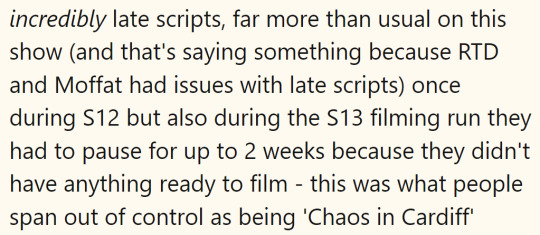
This would later be confirmed at a Gallifrey One panel (⁴) with Matt Strevens, the executive producer, who suggests that filming stopped to allow Chris Chibnall to finish scripts; he further implies that large swathes of episode 5/Block 2 weren't written until Episode 4/Block 1 (in which Kevin McNally debuts) was filming:
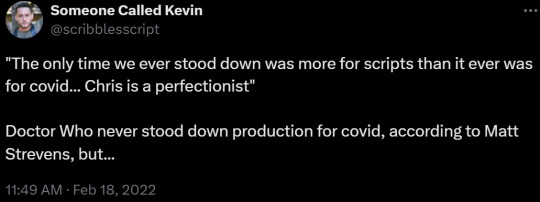

So with that context, let's talk about that Episode 4, "Village of the Angels", the only episode not attributed solely to Chris Chibnall. Co written by Maxine Alderton.
The filming pics reveal an interesting bit of trivia for Village: namely, the clapperboards show that the story was actually filmed as episode 5, not 4:
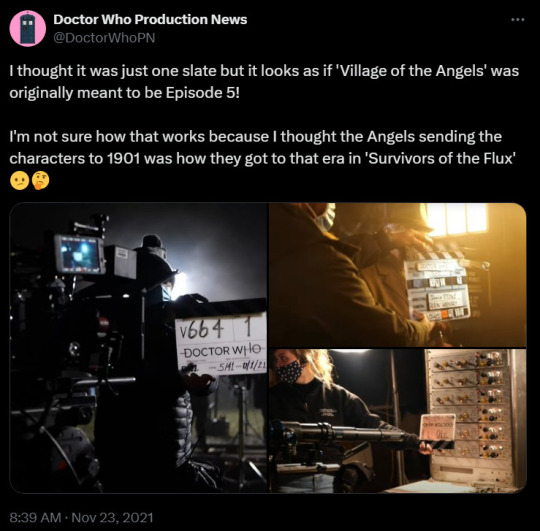
As the above tweet suggests, this doesn't make much sense. The miniseries is, again, a single continuous plot. It's not like they flipped Village and the current episode 5, Survivors of the Flux; the latter explicitly takes place chronologically after it.
And yet, Village having been intended as the penultimate episode 5 is further evidenced by the original trailer for it, in which a character states that the story takes place on the 28th of November. This line is dubbed over in the final episode and subsequent trailers to instead say the 21st:
Why is this line important enough to dub? Because that's meant to line up with the air date of the episode. Episode 4 aired on the 21st and 5 on the 28th. But something happened in post production, and now it's episode 4 on the 21st instead (⁵):

So if none of these episodes were moved around but it does seem like Village was meant to be episode 5, where and what is the original episode 4?
I have a theory.
Flux has a recurring subplot involving two side characters, a married couple (Bel and Vinder) who have been separated by the titular disaster and are traveling the universe to reunite with each other. This story is told through segments sprinkled throughout the episodes. These have a different writing style (including a diary-esque narration only present in these scenes) and an internally consistent visual style that looks somewhat different to the other parts of the season.
Village of the Angels, for instance, is a moody, dark episode set in a village in the 1960s:



However, Bel and Vinder's segments in the episode have a somewhat different look:



On top of this, they never intersect with the episode's A plot (literally or in any clear thematic way), and the majority of these segments piece together into one single scene that seems to have been cut up.
So, what I think is that the bel and vinder scenes across the middle of the season were originally a single full story, an episode 4 that took a breather from the main plot and characters to follow the lives of these two side characters; the differing visual and writing style is due to it originally having been filmed separately and with a somewhat different artistic intent. I believe Chris Chibnall's cowriting credit on Angels exists because these specific scenes are from a script he wrote, but that otherwise the Angel script can be credited solely to Maxine Alderton by normal cowriting standards.
"But wait," you might say, "I thought there were already 6 episodes that are all plot relevant? If no episodes existing right now can be cut, how could this 7th episode exist?"
Remember this tidbit:

The adventures in question comprise a large amount of the next episode (Episode 5: Survivors of the Flux), nearly 20 minutes of a 50ish minute runtime (and frankly, much of the rest of the episode is somewhat fluffy build up that feels like it's taking advantage of an extended runtime). A version without this added plot would, in my opinion, only warrant one final episode rather than two.
I think the showrunner, still scrambling to finish scripts as the episodes were being filmed, and making a snap decision to include a new major subplot (⁶), wrote a finale script so long and with so many plot threads that the only way to keep all this material of was to split it into two episodes, 5 and 6. And because they only could only make 6, he had to get rid of one of the previous 5 episodes - the already scripted and filmed ones - to make room for this new episode 5. A tough order when it's a plot-heavy miniseries...
if not for episode 4 being a standalone divergence from the main plot about the lives of two side characters, one that could, in theory, be cut up and dispersed throughout the season without continuity issues for the main story.
(Some notes and clarifications under the cut)
(1) some sources initially reported the episode count as 8; this wasn't inaccurate - the 2022 new years/easter special were part of the episode order. Flux itself was always meant to be 6 episodes long.
(2) A few of the production issues include:
- episodes filming without a second draft:

- the fx team that had been on the show since 2005 abruptly leaving midseason (because they "didn't feel like part of the team anymore") and returning as soon as the creative team changed, including the head of the studio implying they weren't properly credited (mild vfx body horror warning in link):
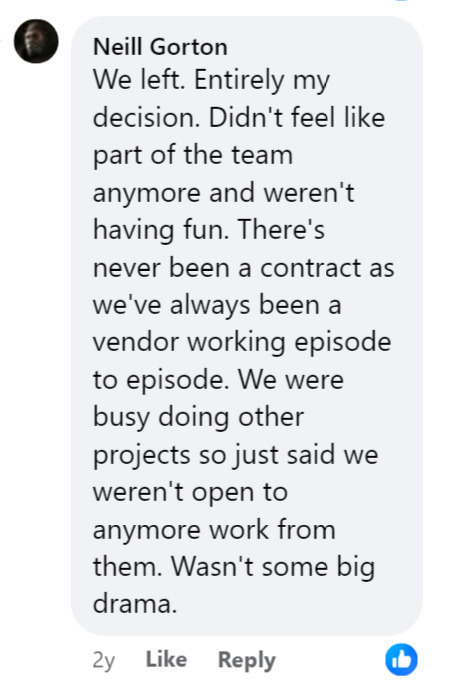
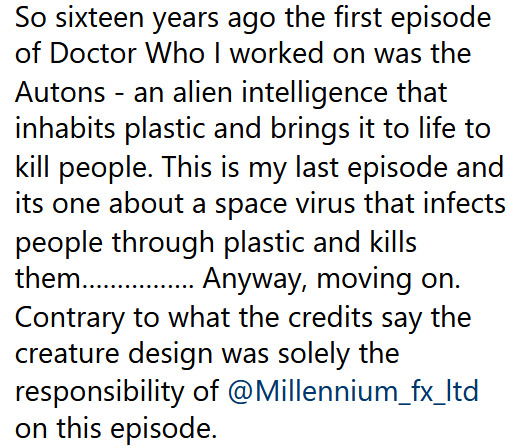
- people working on additional projects such as books not receiving clear information on the characters they were assigned to write:
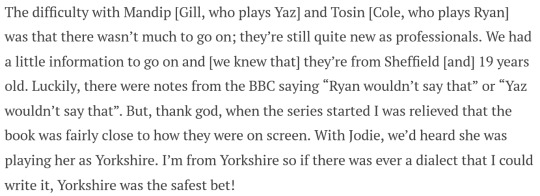

- and likely a director who was put on hold due to a script being rewritten:
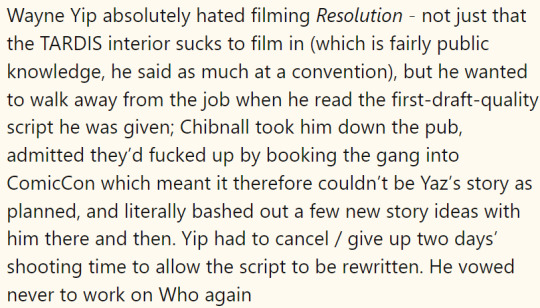
Among other things I can't directly cite at the moment, including vfx artists having to do whole episodes solo in crunch time and writers not being told their work was massively overhauled until it aired due to major changes being extremely late in production.
While I don't wish to pontificate too much here and many of these things are pretty normal by themselves, I do think it could paint a picture of a production where an episode well into filming may genuinely be cut on a whim and without consideration for the crew, artists, etc. working on the show.
(3) This reddit post comes from a leaker who was known to be consistently accurate.
(4) Gallifrey One does not allow filming of panels. I know Kevin's livetweets of panels to be accurate.
(5) It's very, very unlikely the entire season was moved back a week, as the premier is a Halloween special that was certainly always intended to air on Oct. 31st.
(6) I don't wish to insinuate Chris Chibnall is, throughout his career, an inherently poor showrunner, but I do think that maybe his jump from police procedural - a genre that doesn't involve quite as much concept art, vfx work, marketing, convention panels, set building, episodic storytelling, and keeping in touch with expanded universe producers - to flagship science fiction adventure show may have contributed to some of these issues, especially when he was already in the mindset that things could be changed on a whim (perhaps not such a major issue when it's broadchurch and no new sets need be built)
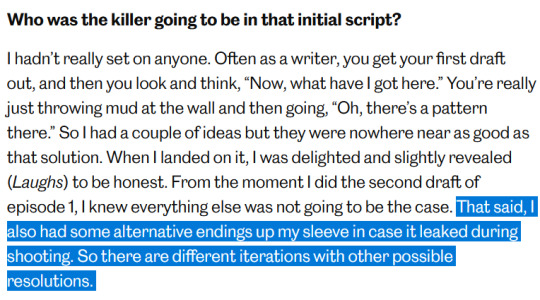
(source)
Basically I don't really think this is "the showrunner's fault" or anything; more that a perfect storm of a showrunner who was habitually late on scripts, used to writing lowkey cop dramas, covid, an entirely serialized season, etc. may have led to these issues
#sorry this is insane#thirteenth doctor#flux#doctor who#long post#thank u to my friends and allies who helped me track down those sources for the scripts being late. i remembered them but couldn't find any
540 notes
·
View notes
Text
Not to do more Furiosaposting (and SPOILERS AHEAD), but a couple more things I noticed on a second viewing:
• I think Dementus is being honest about how he lost his family when Furiosa confronts him about it, and that's a big point the film is making. Furiosa isn't like Dementus when she finally chases him down. But she recognizes that she could become like him - a vile, cruel warlord who uses his own pain as an excuse to run roughshod all over the wasteland, smashing everything in her path, using her pain as an excuse to take from others. By that point, she's already a part of Immortan Joe's war machine. She is already complicit. And he does say to her that killing him won't give her what she wants. She resists the idea, but ultimately, it sure seems like she realizes he's right. And ultimately, that leads to her big choice - make a positive change rather than simply trying to hurt the people who hurt you. Granted, she still does do plenty of hurting the people who hurt her (Nice face you got there, Joe, be a shame if something happened to it). But the big, real legacy she builds is taking the Citadel in the name of a greater cause than fueling Immortan's cult of cruelty.
• Praetorian Jack is also complicit, honestly. And it's something he seems to recognize. He outright says that he's looking for a righteous cause. There's a lot we don't know about this man. He tells us very little of his history, nor do we know why he chooses to ride for Immortan Joe. But we do know that after meeting Furiosa, he wants to do everything in his power to help her. She becomes his righteous cause. So the whole film, Furiosa is kind of pulled between those two directions - Dementus, and Jack. Do you defeat the pain you carry by throwing it back to the people who gave it to you? Or do you seek a righteous cause to build it into something positive?
• Perhaps one of my biggest takeaways is related to Jack's death. It's not until Dementus kills Jack that Furiosa gets really set on revenge. Like she clearly loathes Dementus before that. Her first time meeting him as an adult, she goes straight for her gun. The camera highlights their relationship a lot, and I'm pretty sure her vengeful drive towards him has its own musical motif - listen for that driving, distorted noise that you hear sometimes. But revenge doesn't become her biggest driver until after Jack dies. Even as she feels clear hate and rage towards this man, she's still set on getting home all that time. But when Jack dies, she goes out of her way to try to kill him. And, relatedly, when Jack dies, she loses the arm that has her star map tattoo on it. So to put it another way, when she chooses to commit to vengeance, she loses her way.
• We need to consider perspective and narrator here, as this isn't like Fury Road where it's from the point of view of Max, who was directly there. Because this film's opening shot isn't of Furiosa. It's of another character - it's of the History Man. The first line belongs to him - "As the world falls around us. How must we brave it's cruelties?" The closing narration is his as well. Something that sticks in my head more and more is Dementus' ultimate fate. What gets me about it is that it feels implausible. Not only for Furiosa as a character, but for the way the series usually handles injuries. So George Miller was a paramedic before he was a filmmaker. In fact, his work as a paramedic is what partly inspired the first Mad Max film and what funded it. And in these films, Miller has put his medical knowledge to use. The characters' injuries are usually handled in a realistic way, with a few flights of fancy for people to make it through frankly absurd car wrecks. You see this especially in Fury Road, which takes the time to establish that Max is a universal donor twice so it makes sense to have him give a blood transfusion to Furiosa at the end. It talks about the ultimate effects of her collapsed lung and how to treat it. The injuries in these films feel realistic in a way movie wounds often don't. Dementus' final fate does feel a little complicatedly cruel for someone as pragmatic as Furiosa, but what really gets me is how medically implausible it is. We're supposed to believe that Dementus has been stuck in the citadel with a peach tree growing out of him for five years without dying? I...kinda don't. Why does this matter? I think it signals that aspects of the story fall to unreliable narration. These films are campfire stories from a world that fell and rose again. Always have been. But this one has a more direct narrator. The History Man is telling this story. It is filtered through his perspective.
• And that adds another layer to things, considering Furiosa and the History Man's backgrounds. We see the History Man, we see a guy who is clearly horrified by Dementus' actions. When Furiosa's mom is getting executed, he cries. He tells Furiosa that she needs to make herself indispensable - likely because he feels that it's the best way to protect her. But he still does Dementus' bidding, often without question or argument. In a word, the thing that ultimately separates the History Man from Furiosa is that where he was complicit until the very end, Furiosa chose to rebel.
• And I guess if I had to boil it all down, I think there's a great big takeaway from this film. Don't seek hope. Become hope.
Man, I love this movie.
#mad max furiosa#furiosa#furiosa a mad max saga#mad max#george miller#mad max fury road#long post warning
420 notes
·
View notes
Text
holy crap okay so
I'm two episodes into Kaos
normally I keep my expectations pretty minimal because, let's be real, the Internet - and especially Tumblr - has a tendency to severely overhype new series to be way better than they actually are and it often leaves me sitting there like "that's it? that's what people were freaking out over for weeks?? that was just a bunch of cheap ships and tropes that i've seen 123785902380 times before" LMAO
BUT thankfully compared to other series like Hazbin Hotel and The Amazing Digital Circus, I haven't been worn out on excessive fandom exposure prior to watching Kaos, so I didn't really know what to expect going in besides what folks have told me so far - it's a modern-day Greek epic, and it stars Jeff Goldblum as Zeus (which is, unsurprisingly, peak casting).
That said, I'm very pleased to say that so far, the show is absolutely blowing me away. The set designs, characterizations, weaving of all the players into a central narrative led by a very coy narrator, all of it feels both refreshing and respectful to the source material at the same time.
so uh yeah that LO animated TV show... we have reason to believe now that it's gotten picked up by Amazon Prime, at least according to the showrunner's LinkedIn and posting history from February of this year that seems to imply LO may have been picked up by Amazon-

(but still, nothing's really been confirmed because they're being so tight-lipped about this you'd almost think it's because there isn't a show happening at all cough)
But even then, that means at best we still won't see anything of the LO TV show adaption for another 2-3 years, depending on how production goes.
Why am I talking about LO right now? Well it should be obvious - Kaos double-whammied LO by beating it to the punch at its own game.
I mean, just look at the creative choices alone in the design of the Underworld and its rulers, our beloved Hades and Persephone.
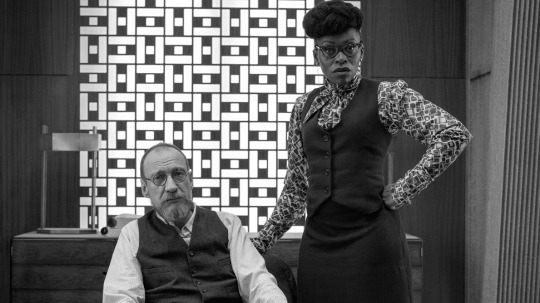
And yes, the entire Underworld is color-graded like this, something so simple and yet effective in communicating the nature of the Underworld and what it stands for - a place where the past lives on through the dead, paused in time, devoid of the vibrant color grading found in Olympus - or "Olympia" as its been named in this retelling - which is, by the way, a visual treat to take in every time it's featured.

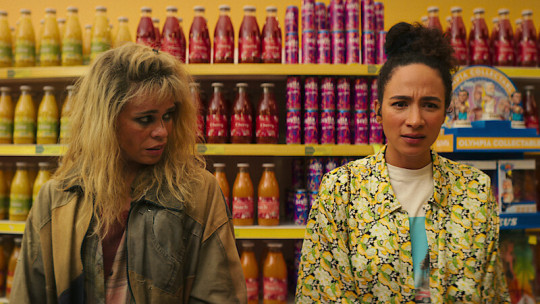
(and yes, that is S-tier-companion Billie Piper on the left, but I will not tell you who she's playing, you actually really should go into this show as blind as possible for the thrill of figuring out these characters as they're introduced <3)
That's not even getting into the narrative structure of the plot itself or the phenomenal casting and acting, but again, I don't want to spoil too much as the show is quite new, and I want to actually finish watching the show myself before I get more into the details of its story and how it delivers it (I'm very much hoping I will still be singing this show's praises at the end of its 8 episodes, please for the love of god don't jump the shark, I don't think my heart can take that kind of pain again.)
All that's to say though, Kaos is, so far, exactly what us disappointed fans of LO deserve after all these years, and frankly, I feel like whatever is coming for the LO animated TV show is really gonna have to step up to the plate to both live up to the bar that Kaos has set as well as stand on its own without being affiliated as a cheap Amazon knockoff living in its shadow. Sounds a little familiar and a bit ironic, doesn't it?
301 notes
·
View notes
Text
updated 08/02/24: here is a part 2 to this analysis!
i think one of the most disturbing yet funny things about sebek antis is how they manage to twist a well written narration about internalized racism and the struggles of being a mixed person into something relating to “fascism”.
( btw there will be SLIGHTTT b7 spoilers in here but i personally think it’s whatever, no big difference to what we’ve known in the past nothing shocking. )
as his biggest fan AND as an ethnic person i feel as though you HAVE to be brain dead and/or white to not understand any of this. he doesn’t genuinely believe that humans are an inferior race, he has MULTIPLE instances praising human people ( riddle, epel ). and the evidence is in firstly, epel’s school uniform vignette where he praises his apple carving, saying it’s even nice enough to be used as a gift to malleus, and we KNOW how highly he regards him. and not once does he ever say anything like “for a human”, or insult him for “being human”, he appreciates his skill.
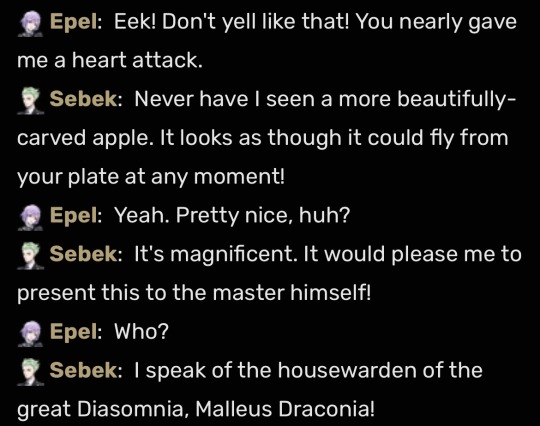
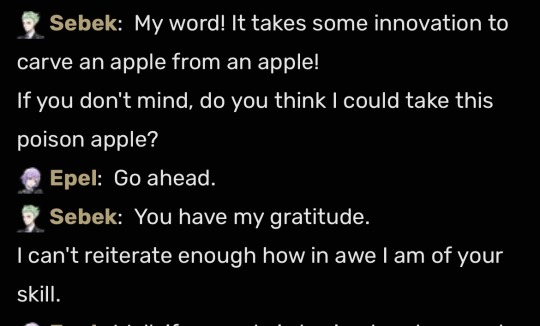
then there’s riddle’s ceremonial robes vignette, and while he does look down on him, it’s not really even about being human saying, “i would better be served by weight training than riding with a bunch of amateurs” ( in reference that here we see him initially join the equestrian club ). but once riddle proves his skill, sebek is more than willing to respect him highly.
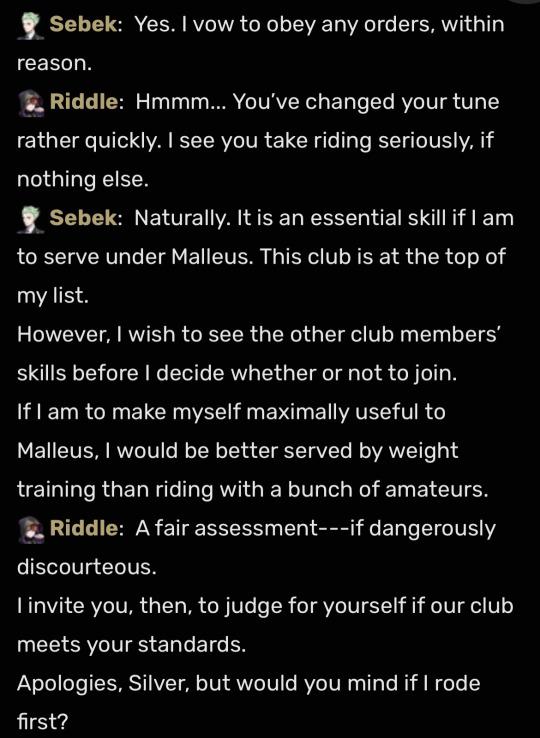
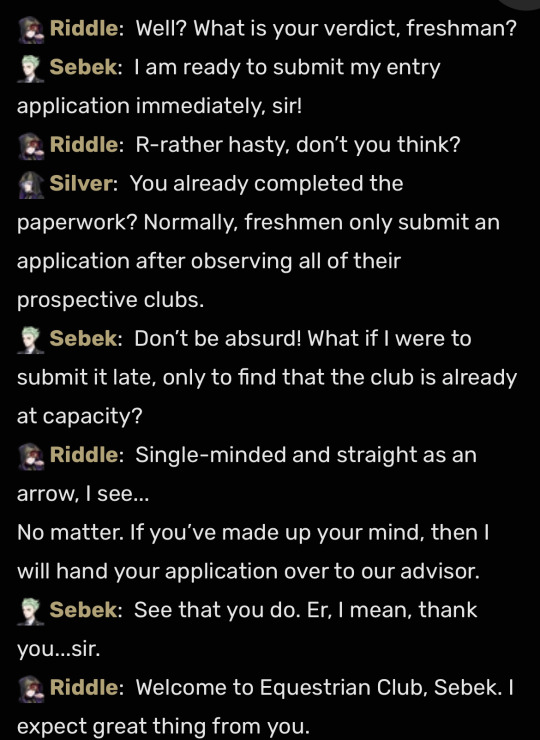
( a small thing from the harveston event that i’ve been told of from a friend as well, he also holds high respect and love for marja. initially he wasn’t fond of her, but she gave him a squirrel plushie for the plush sled race. because of this he’s basically like, “she’s the only reason i got this far!!” and praises her. i haven’t played the event and this is what my friend says, but i figured to at least include this. )
the most insane part is you don’t even have to scour through every single moment he shows up on screen to know this, it even shows in his WIKI that one of his dislikes/pet peeves is “whining.” to be clear, while admittedly he does make patronizing remarks in regards to humans, it’s never enough to say he has a genuine hatred, and in fact he proves the opposite many times, in both epel and riddle’s case. and, in regards to the personality section, again referencing epel and riddle ( there may be other examples, they just happen to be the ones i found specifically ), he isn’t afraid to acknowledge and respect people for their talent or skills, even if they are human.
and if you’re wondering what i mean by it being ethnically related, fae are canonically ( say it with me now canonically, ) considered to be a minority race. being half human half fae is what makes him mixed, equally canonically so. as far as i’m concerned basically everyone in the fandom knows this but the complexity around this part of his character is just SO undermined that people are willing to call him “openly racist” ( to others, not his internalized racism ) and a FASCIST. are you serious?
we know already that sebek learned a lot of what he thinks now from his grandfather, ( sebek zigvolt wiki, trivia ) considering malleus and lilia commenting that his temper is a trait he gets from him ( scary monsters event story for malleus ), which of course is likely what garners his dislike towards his human aspect and his father for being human, even considering his father outputting, trailing off when noting he is human, while being prideful in his mother who is a fae ( birthday boy vignette ).
and what do we learn about his grandfather? he was in a war against humans, which makes it obvious enough how he would learn this internalized racism and why he would put down that part of his human identity. remember that fae age differently, this war wasn’t even that long ago for them. i think it’s a shame people seem to put so much love into diasomnia but not even recognize its lore that’s rooted so deep yet at the same time is right in front of our face.
but that’s all from me folks. willing to dive deeper into my sebek love and analysis if anyone wants it!
#inside kay’s mind#kyupidos#twst#twisted wonderland#sebek#sebek zigvolt#disney#disney twisted wonderland#diasomnia#twst diasomnia#sebek twst#sebek twisted wonderland#sebek zigvolt twisted wonderland#sebek zigvolt twst#book 7#twst book 7#twisted wonderland analysis#twst analysis
332 notes
·
View notes
Text
Okay, so fresh Wandee Goodday theory coming through.
I know we all thought Yak was going to be the one who knew he fell first, because he’s in so deep, but after Ep 4, I’m not so sure.
One, Dee has Plakao to be his voice of reason and is already admitting to Kao that he’s jealous of Yak’s crush and Kao is making observations like this.
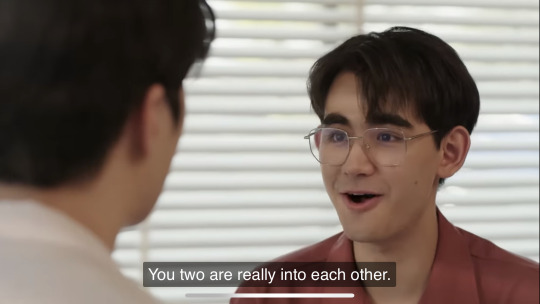
Conversely, when confronted by Cher about his feelings for Dee through the evidence of giving away his prized name necklace and effectively claiming Dee, Yak denies it by saying that Cher already knows who Yak has feelings for and when pushed says this:
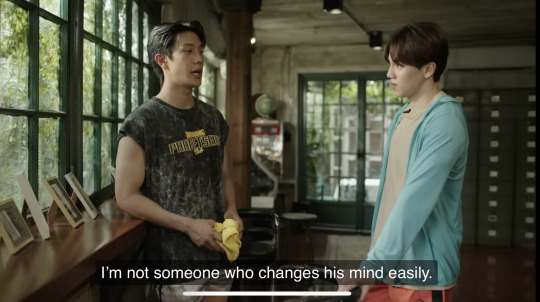
Which, the phrasing of “I’m not someone who changes his mind easily.” Is a really interesting denial. Because he’s affirming his commitment to his feelings for Taem. That just because he has Dee and they’re close doesn’t mean he’s going to change his mind or his feelings.
And it got me thinking of some other bits of nuggets we got about the Phadetseuk family.
His mom opened the gym and when asked about his parents Yak makes the saddest faces.
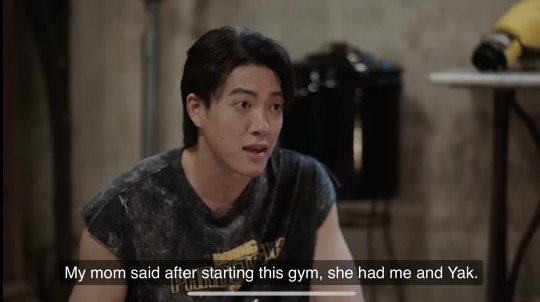

We now know thanks to the cold shower that was this week’s cold open that their mother died. But that leaves us with the question of where is their dad. Because my sweetest boys were alone at the hospital.

And their dad wasn’t there. Now maybe something happened to their dad, but there is an actor listed for Yei and Yak’s father and step mother.
Which made me speculate that perhaps there’s a reason that Yak is committed to not changing his feelings for Taem. Perhaps his determination to not be a person who changes his mind easily is tied to their father leaving their mother for their step-mother. And the concept of being like his father, someone whose feelings change easily, and can leave someone they care for, is not something Yak would want.
And I wonder, if this is true (and I could be wrong) how long Yak will hold on to his feelings for Taem even though she does not return them and how committed he will be to becoming a different person so that she might like him when Dee likes him exactly as he is.
Definitely curious if part of his feelings for Taem are tied to her helping him study and how his mom sat and encouraged him. Dee filled a bit of that function this week and it was a beautiful parallel but Taem has been doing it longer.
And don’t get me wrong, Dee is gonna have his own issues. He’s a hopeless romantic who definitely is not always the most reliable narrator, but he’s coming around. Still waiting to learn more about his parents car accident and how that’s left him desperately wanting someone to care for him.
These two are delightful and well fleshed out characters. I cannot wait to watch them continue to stumble through this fake dating disaster they’ve created.
#wandee goodday#wandee gooday the series#yakdee#yakwandee#yoryakwandee#yoryak x wandee#deeyak#wandeeyak#wandeeyoryak#wandee wittaya#yoryak phadetseuk#wandee goodday meta#doublel27 talks
213 notes
·
View notes